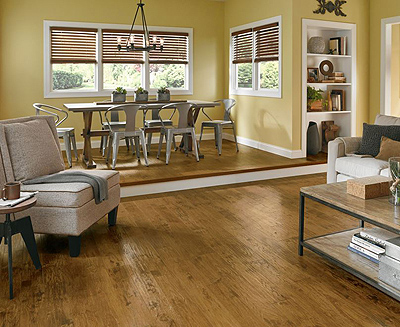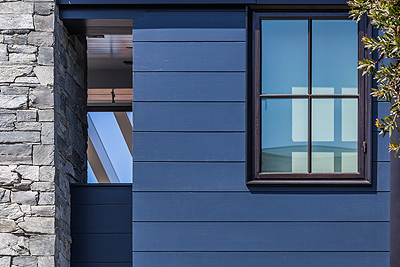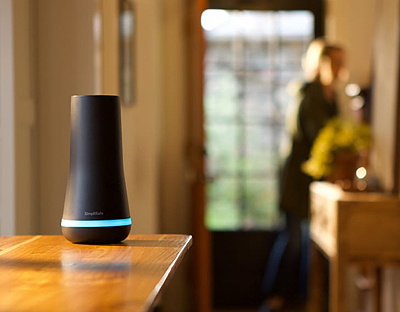Home Products That'll Protect Your Investment
by Rachel Lyon, Editorial Director for The House Designers
Building a home gives you a greater appreciation for what goes into the process and what results. It can be daunting to make product selections when you’re personally invested, so think about where you want to put your money. Is there one aspect you want to focus on? Remember—what you put into the house will dictate its upkeep needs and performance for years, and that can affect its value. If you aren’t big on maintenance, invest in durability and focus on finishing products that protect your home for you!
PRYZM products from
Armstrong® Flooring are extremely durable—100% waterproof and highly resistant to dents, scratches, and stains! You can get a gorgeous wood-look floor like this
Treeline Hickory Rigid Core – Amber without signing up for ongoing maintenance and the fear of damaging it with daily use.
Durable Finishing Products
Finishing the interior usually tops the list of most exciting parts of home building. You can get wrapped up in the practically endless possibilities for every room, knowing you’ll see and interact with each part every day. But all that daily living can take a toll on some products, and often the ones you rely on most. Flooring, countertops, and even walls take a lot of abuse, and their maintenance requirements vary wildly by the material. Keep that in mind as you shop, and don’t worry—you’ll find attractive colors, patterns, and overall aesthetics in each category.
Look for no-fuss materials that offer you greater peace of mind. If you don’t want to baby natural wood floors, look for alternatives that mimic the look with much more durable materials like vinyl, rigid core, or tile. These waterproof, highly scratch-resistant options come in an array of patterns and with warranties that’ll put you at ease. The same can be said of engineered quartz and solid surface countertops, which far outshine natural stone in terms of resilience to everyday challenges. And make sure you use appropriate wallcoverings—don’t use flat paint where it might get stained or absorb moisture and grow mold! High gloss paint you can clean, tile, or even high pressure laminate make better choices. As always, you can ask your builder or an interior designer for recommendations based on your needs.
Robust Exterior Products
There’s been a big shift away from high-maintenance exterior products over the years—that’s why it’s so rare to find new construction with wood roofing and siding. But even among all of the modern, manufactured possibilities on the market, you’ll find they have different pros and cons, and their warranties might not even be close to comparable. Look for companies that stand behind their products, but also take your environment into account. Different areas experience different challenges—like high heat and glaring sun that can melt some resins, dampness that promotes algae growth, wind and hail that can dent and shatter certain materials—and a smart decision may be able to save you time and money over the years and/or in the event of extreme weather.
Product data sheets can help you compare roofing and siding. Look at results for water absorption, flexural strength, and termite, fire, impact, and fungal resistance. It’s important to look at the numbers so you can make fair comparisons, but be sure to give priority to what matters most in your case. For instance, a homeowner in California should prioritize fire resistance to minimize the risk of a windborne ember setting the house alight, whereas somebody in Alabama should prioritize impact and insect resistance for protection during hurricanes and against termites, which are prolific there. Set the house up for success from the outside so it’s better equipped to protect everything inside!
This base station from
SimpliSafe™ is the brain of the system that notifies you of any issues that come in from sensors. Check out the
Security Shop to find the best system for your needs, or build your own custom package. It’ll be easy to set up and doesn’t lock you into a contract!
A Good Home Security System
What makes a home security system good, exactly? It has to be dependable, easy to use, and non-restrictive. Security companies that make homeowners sign a long-term contract have fallen out of favor for a number of reasons, and now you can sign up for month-to-month coverage that earns your continued business. These systems are simple to set up yourself and cover all your security needs, with sensors that alert to burglaries and hazards. Hazard sensors let you know about problems quickly—even when you’re not home, through an app—so you can address them and prevent more damage. For instance, a temperature sensor will alert if it gets cold enough to burst pipes, and a water sensor can detect leaks around the water heater or other plumbing. A good security system can protect your new home investment in all kinds of ways!
Don’t forget that there are still plenty of other parts of the house that you’ll need to check, clean, and possibly repair regularly. Smoke detectors, HVAC filters and ducts, gutters, the range hood filter, the water heater, etc., all perform important functions, and it’s in every homeowner’s best interest to stay on top of any issues that may result from age or wear and tear. Not only will this improve household safety and efficiency, but it can prevent more costly problems down the road. Invest in products that minimize maintenance needs elsewhere so you can shrink your to-do list!



.png)
.png)




